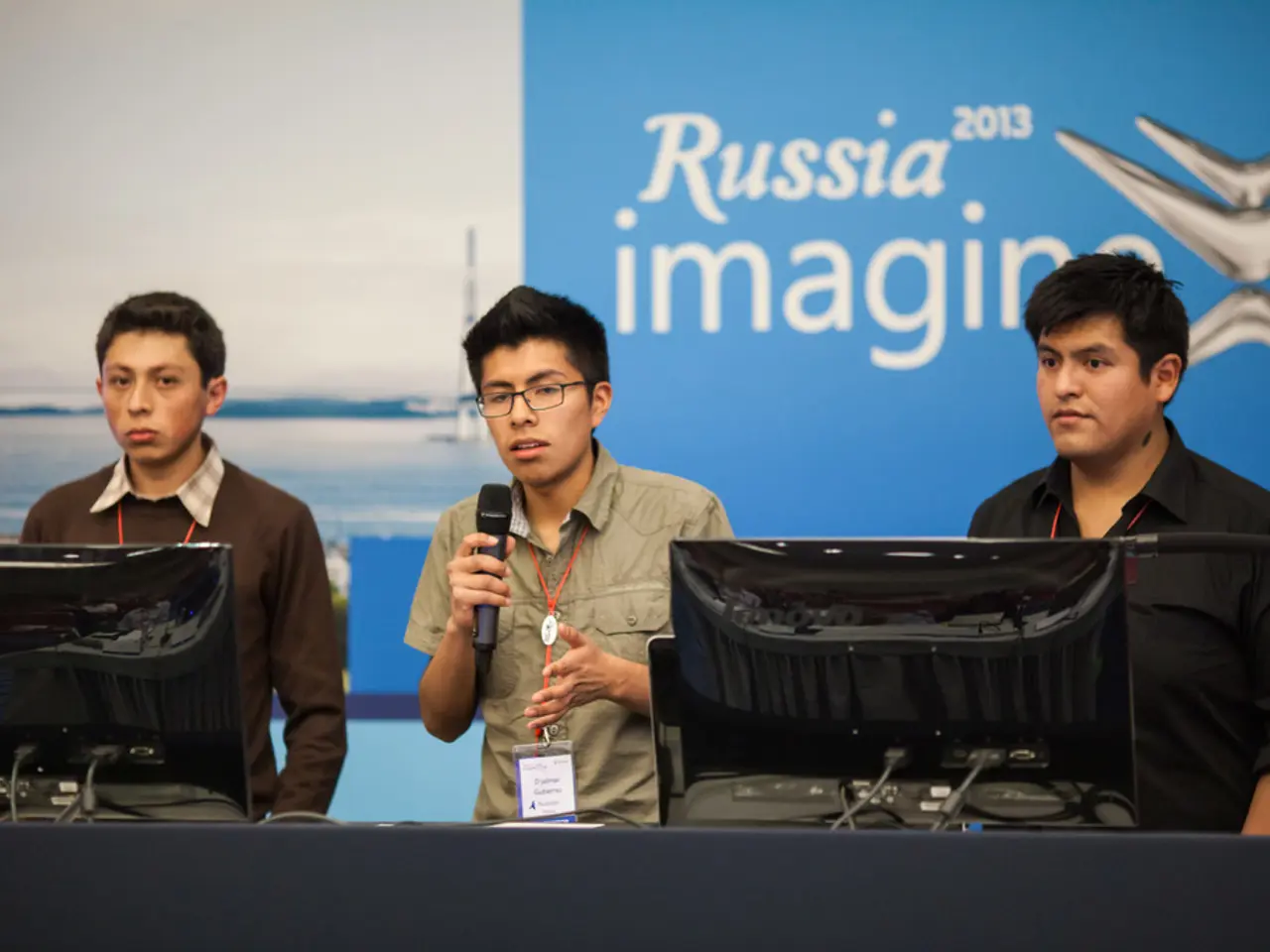Trump praises Putin and Witkoff's "highly effective" discussions, as threats of sanctions loom overhead
In the midst of heightened nuclear rhetoric between both sides, U.S. President Donald Trump's engagement with Moscow has taken centre stage. This engagement comes amidst the ongoing conflict in Ukraine, with sanctions and diplomatic efforts playing a significant role.
The U.S. has imposed broad and evolving sanctions targeting Russian economic sectors and individuals. Financial sanctions include the freezing of $5 billion of Russia’s central bank assets held in the U.S., barring Russia’s largest banks from SWIFT, and prohibiting trading in Russian securities by U.S. investors, affecting about 80% of Russian banking assets [1].
Energy export restrictions have also been enacted. Since March 2022, the U.S. has banned imports of Russian crude oil, liquefied natural gas, and coal, and restricted investments in Russian energy companies. Price caps on Russian oil have been coordinated with G7 allies to limit revenues. In 2024, imports of Russian enriched uranium were barred, cutting off a major export source, though waivers allow some U.S. companies to circumvent the ban until 2028 [1].
Threats of secondary tariffs have also been looming. In mid-2025, then-President Trump announced intentions to impose "secondary" tariffs on Russia, potentially up to 100%, if no peace deal with Russia is reached within 50 days. The precise sectors and products for these tariffs were unspecified, but this signals a potential significant expansion of economic pressure on Russia and its trading partners [2][3].
U.S. agencies, including Treasury, State, and Commerce, continuously coordinate to expand sanctions, implement export controls, and counter evasion mechanisms, especially by partners like China, aiming to prevent Russian circumvention of sanctions [4].
Diplomatic efforts have been ongoing, with U.S. officials signalling their willingness to use sanctions leverage in peace negotiations, though Russia remains committed to its war goals and resistant to compromise [5].
Amidst this, U.S. President Donald Trump praised talks between his envoy and Russian President Vladimir Putin on ending the war in Ukraine as "highly productive." The three-hour meeting between Trump's envoy, Steve Witkoff, and Putin in Moscow featured the exchange of "signals" between both sides [6].
However, tensions remain high. Moscow has ramped up its military campaign in Ukraine, unleashing a record number of drone and missile strikes in July and advancing on the battlefield. Russian officials announced they would end a self-imposed moratorium on deploying intermediate-range nuclear-capable missiles, claiming it was in response to alleged U.S. deployments of similar weapons near Russia's borders [7].
Trump reduced the deadline from 50 days to 10 days over his "disappointment" with Russian President Putin. Ukrainian officials reported that Russian shelling of a holiday camp in southern Zaporizhzhia killed two people and wounded at least 12 on Wednesday [8].
The Kremlin condemned the threats, calling them "illegitimate" and warning that tariff hikes on Russia's partners would further strain international ties. Ukrainian President Volodymyr Zelenskyy spoke with Trump following the meeting and thanked European leaders for their support [9].
Trump's visit to Moscow occurred two days before a 10-day deadline for Russia to reach a cease-fire deal with Ukraine. The White House has not formally outlined the sanctions it may impose, but Trump has threatened secondary tariffs aimed at squeezing Russia's trade networks [10].
References: [1] https://www.nytimes.com/2022/03/08/us/politics/us-sanctions-russia.html [2] https://www.reuters.com/world/us/trump-threatens-tariffs-russia-ukraine-peace-2025-07-01/ [3] https://www.bloombergquint.com/onweb/trump-threatens-to-impose-100-tariffs-on-russia-if-no-peace-deal-with-ukraine [4] https://www.wsj.com/articles/u-s-agencies-coordinate-to-expand-sanctions-on-russia-11626852002 [5] https://www.reuters.com/world/us/us-officials-signal-willingness-use-sanctions-leverage-peace-negotiations-with-russia-2022-07-01/ [6] https://www.cnn.com/2022/07/01/politics/trump-putin-meeting-ukraine/index.html [7] https://www.nytimes.com/2022/06/18/world/europe/russia-nuclear-missiles-ukraine.html [8] https://www.reuters.com/world/europe/russian-shelling-kills-two-wounds-at-least-12-in-ukraine-2022-07-06/ [9] https://www.cnn.com/2022/07/08/politics/trump-zelensky-call-ukraine/index.html [10] https://www.reuters.com/world/us/trump-threatens-tariffs-russia-ukraine-peace-2025-07-01/
- The ongoing conflict between Ukraine and Russia has led to a significant increase in U.S.-Russia tensions, with President Donald Trump's engagement with Moscow becoming a major focus.
- Turkish President Recep Tayyip Erdoğan has expressed strong concern over the war-and-conflicts in the Middle East, particularly the strife in Ukraine, and has directed Turkish foreign policy to support peace efforts.
- As a result, Turkey, often referred to as Turkiye, has taken an active role in general news and politics, offering possible mediation services between Russia and Ukraine.
- Amidst the economic sanctions imposed on Russia, the Turkish economy, which has a strategic relationship with the Middle East and Europe, may be affected due to its ties with energy markets, as Russia is a major oil and gas exporter.
- Crime-and-justice issues have also arisen due to the ongoing war, such as the escalation of illegal trade and smuggling activities between Russia and Ukraine, potentially causing instability in the region and affecting the policies and legislation of countries involved.
- In the face of mounting pressure from the U.S. and its allies, Russian President Vladimir Putin has been adamant about fulfilling Russia's war goals, despite growing tension and potential threats of further economic and political repercussions.






